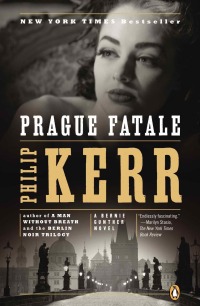Prague Fatale by Philip Kerr
 Saturday, August 24, 2013 at 5:31AM
Saturday, August 24, 2013 at 5:31AM 
First published in the UK in 2011; published in the US in hardcover by Marian Wood/Putnam in 2012 and in paperback by Penguin in 2013
Noir is dark by definition, but Bernie Gunther is at his gloomiest in Prague Fatale. He's coping with the ugly events that marked him in earlier novels. It is 1941 and Bernie is back in Berlin. After harrowing experiences in Belorussia, feeling that he is merely "a blur" of the man he once was, Bernie entertains thoughts of suicide. When he looks at the mangled body of a man hit by a train, he sees himself. He is inspired to live only by the knowledge that so many Jews with so much less have soldiered on.
The mangled body is that of Geert Vranken, who came to Germany from Holland in search of employment. That his death was neither an accident nor suicide is clear from the multiple stab wounds that cover his torso. Bernie makes little progress in the death investigation until he saves a beautiful woman named Arianne Tauber from a mugging. Arianne eventually tells Bernie an intriguing story about an envelope she was hired to deliver that has now gone missing. The information causes Bernie to investigate the death of a Czech spy before he is summoned to Prague by General Heydrich, in whose pocket Bernie unwillingly resides. At that point Prague Fatale turns into a locked room murder mystery, giving Bernie a chance to exercise his considerable detective skills.
Because Prague Fatale is a murder mystery linked with a spy mystery, the plot is even more intricate than is common in the Bernie Gunther novels. The mystery's resolution isn't entirely unexpected but the setup is clever. A plot twist at the end is too often foreshadowed to be truly surprising, but it is nonetheless satisfying. A final twist seemed to be tacked on as an afterthought. The Nazi intolerance of (and hypocrisy toward) homosexuality is one of the novel's better themes, given that gay men are among the forgotten victims of Nazi tyranny.
By now, Bernie Gunther fans are so used to the character that his understandably bitter complaints about his life are taking on a broken record quality. He gives voice to his fears of what the Nazis are doing to him, and to Germany, so often that it becomes a numbing mantra. Prague Fatale would have been a tighter novel without the frequent repetition of Bernie's angst. Still, that's a relatively minor quibble. Bernie Gunther is who he is (as he often tells us), and that's what makes these novels so absorbing.
RECOMMENDED
Reader Comments